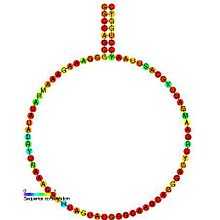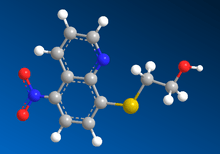HIV gag stem loop 3 (GSL3)
| HIV gag stem loop 3 (GSL3) | |
|---|---|
 | |
| Predicted secondary structure and sequence conservation of HIV_GSL3 | |
| Identifiers | |
| Symbol | HIV_GSL3 |
| Rfam | RF00376 |
| Other data | |
| RNA type | Cis-reg |
| Domain(s) | Viruses |
| SO | 0000233 |
HIV gag stem loop 3 (GSL3) is a secondary structural component of the Retroviral Psi packaging element, also known as the psi recognition element. This domain plays a major role in RNA packaging and is located the 5’ untranslated region of the unspliced HIV-1 genome.[1][2][3] GSL3 is known to direct specific packaging of HIV-1 genomic RNA. While deletion of GSL3 leads to decreases in both viral RNA packaging and dimerization, mutagenic studies have shown that it does not completely eliminate encapsulation of retroviral RNA.[4][5]
Pharmaceutical Advancements
Interaction with NCp7
RNA encapsulation involves detection of the psi recognition element by the protein NCp7. NCp7 contains two successive zinc fingers which are linked by a stretch of basic residues. Their function is to activate annealing of primer tRNA to the initiation site (where reverse transcription occurs).[6] During this process, GSL3 interacts with NCp7 specifically. Current pharmaceuticals utilized for HIV/AIDS treatment inhibit fundamental processes in the replication cycle of the retrovirus. This interaction is a potential point of inhibition.
Inhibitory Ligands
Inhibitor development remains in an early phase. The challenge of synthesizing a compound with a simple molecular structure and low molecular weight in order to limit side interactions and the existence potentially detrimental stereoisomers requires both a computational and high-throughput approach.[7] 2-((5-nitroquinolin-8-yl)thio)ethanol, a potential lead compound, is shown below. It is selective for the loop structure of GSL3 over double and single stranded RNA. This implies that if released in a cell targeted by HIV, it would block the stem-loop and thus limit productive interaction with NCp7.[7]
 An example of a lead compound. See Ref. 7 for additional information |
References
- ↑ Amarasinghe, GK; De Guzman, RN; Turner, RB; Chancellor, KJ; Wu, ZR; Summers, MF (Aug 11, 2000). "NMR structure of the HIV-1 nucleocapsid protein bound to stem-loop SL2 of the psi-RNA packaging signal. Implications for genome recognition.". Journal of Molecular Biology 301 (2): 491–511. doi:10.1006/jmbi.2000.3979. PMID 10926523.
- ↑ Darlix, JL; Lapadat-Tapolsky, M; de Rocquigny, H; Roques, BP (Dec 8, 1995). "First glimpses at structure-function relationships of the nucleocapsid protein of retroviruses.". Journal of Molecular Biology 254 (4): 523–37. doi:10.1006/jmbi.1995.0635. PMID 7500330.
- ↑ Dietz, J; Koch, J; Kaur, A; Raja, C; Stein, S; Grez, M; Pustowka, A; Mensch, S; Ferner, J; Möller, L; Bannert, N; Tampé, R; Divita, G; Mély, Y; Schwalbe, H; Dietrich, U (May 2008). "Inhibition of HIV-1 by a peptide ligand of the genomic RNA packaging signal Psi.". ChemMedChem 3 (5): 749–55. doi:10.1002/cmdc.200700194. PMID 18205165.
- ↑ Damgaard, CK; Andersen, ES; Knudsen, B; Gorodkin, J; Kjems, J (Feb 13, 2004). "RNA interactions in the 5' region of the HIV-1 genome.". Journal of Molecular Biology 336 (2): 369–79. doi:10.1016/j.jmb.2003.12.010. PMID 14757051.
- ↑ Advances in Hiv-1 Assembly and Release. Springer Verlag. ISBN 978-1-4614-7728-0.
- ↑ Morellet, N; Jullian, N; De Rocquigny, H; Maigret, B; Darlix, JL; Roques, BP (Aug 1992). "Determination of the structure of the nucleocapsid protein NCp7 from the human immunodeficiency virus type 1 by 1H NMR.". The EMBO Journal 11 (8): 3059–65. PMID 1639074.
- ↑ 7.0 7.1 Warui, DM; Baranger, AM (May 10, 2012). "Identification of small molecule inhibitors of the HIV-1 nucleocapsid-stem-loop 3 RNA complex.". Journal of Medical Chemistry 55 (9): 4132–41. doi:10.1021/jm2007694. PMID 22480197.